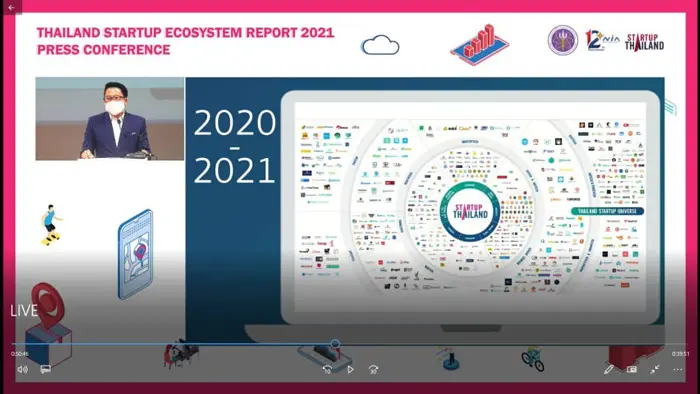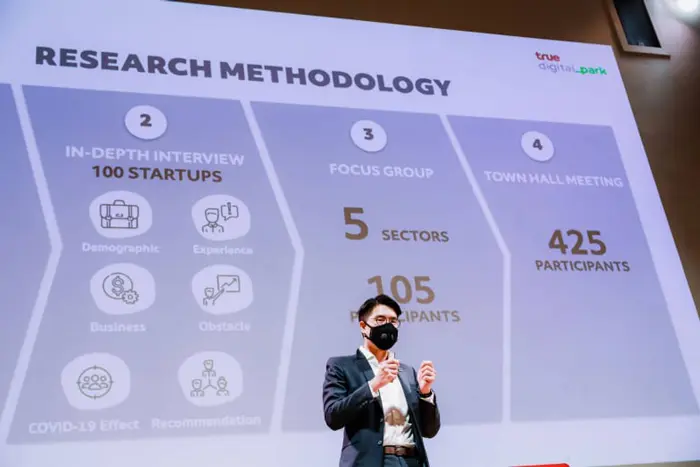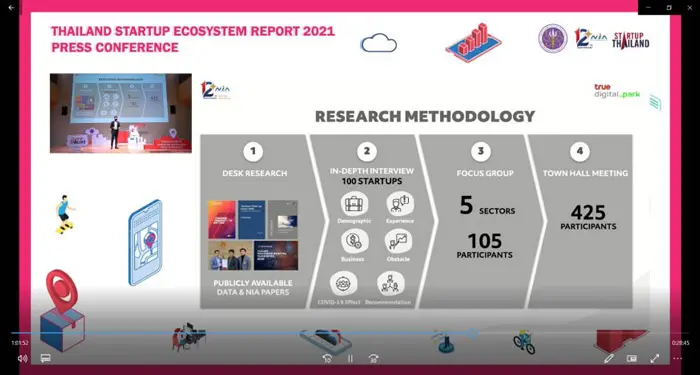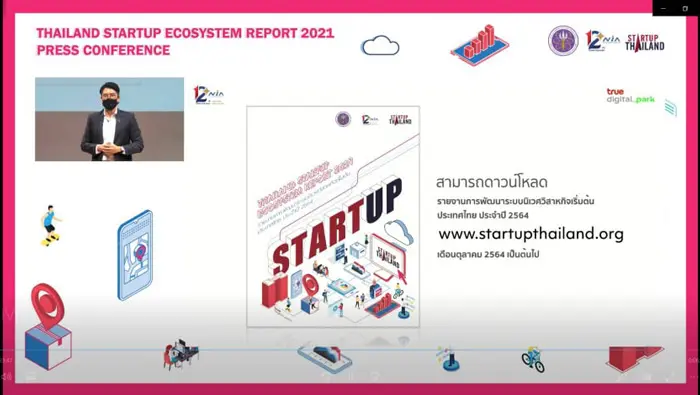สำนักงานนวัตกรรมแห่งชาติ (องค์การมหาชน) หรือ NIA ทำงานร่วมกับภาคีเครือข่ายทั้งภาครัฐและเอกชน เพื่อส่งเสริมแหล่งความรู้ ตลอดจนการพัฒนาฐานข้อมูลให้แก่กลุ่มวิสาหกิจเริ่มต้นหรือสตาร์ทอัพ สำหรับใช้เป็นกลไกหนึ่งที่จะช่วยขับเคลื่อนเศรษฐกิจและสังคมไทยให้ก้าวหน้า ซึ่งล่าสุด NIA ได้ริเริ่มและจัดทำ ‘รายงานการพัฒนาระบบนิเวศวิสาหกิจเริ่มต้นประเทศไทย ประจำปี 2564’ ซึ่งจะนำเสนอข้อมูลภาพรวมภูมิทัศน์ของระบบนิเวศสตาร์ทอัพในปีที่ผ่านมา เพื่อเป็นแนวทางในการส่งเสริมสตาร์ทอัพรุ่นใหม่ ให้มีความสามารถในการประกอบธุรกิจรวมถึงแข่งขันกับคู่แข่งได้อย่างมีประสิทธิภาพ และมีระบบนิเวศสตาร์ทอัพ (Startup Ecosystem) ที่เอื้อต่อการประกอบธุรกิจมากขึ้น เพื่อเร่งสร้างผู้ประกอบการรายใหม่ที่ใช้องค์ความรู้ด้านวิทยาศาสตร์ เทคโนโลยีและนวัตกรรมอย่างเป็นระบบ

ดร.พันธุ์อาจ ชัยรัตน์ ผู้อำนวยการ NIA กล่าวว่า “รายงานการพัฒนาระบบนิเวศวิสาหกิจเริ่มต้นประเทศไทย ประจำปี 2564 เป็นรายงานฉบับที่ 4 ที่ได้จัดทำต่อเนื่องมาตลอดตั้งแต่ปี 2557 โดยได้รับความร่วมมือจากประชาคมกว่า 300 ราย ทั้งกลุ่มสตาร์ทอัพไทยและต่างชาติ นักลงทุน ภาคการศึกษา ภาครัฐ และหน่วยงานที่เกี่ยวข้อง มาร่วมกันแสดงความคิดเห็น โดยมีเป้าหมายร่วมกันคือ การเพิ่มขีดความสามารถในการแข่งขันสู่การสร้างนักรบใหม่ทางเศรษฐกิจ พร้อมผลักดันประเทศไทยสู่เศรษฐกิจฐานนวัตกรรม และพลิกฟื้นเศรษฐกิจและสังคมของประเทศในเร็ววัน นอกจากนี้ NIA ยังเปิดโอกาสในการเข้าถึงและใช้ประโยชน์โครงสร้างพื้นฐานทางนวัตกรรม การสนับสนุนงานวิจัย การอบรมพัฒนาด้านทักษะหลากหลายด้าน รวมถึงการใช้องค์ความรู้ด้านวิทยาศาสตร์ เทคโนโลยี และนวัตกรรมอย่างเป็นระบบ เพื่อเพิ่มคุณค่าให้สตาร์ทอัพไทยอย่างยั่งยืน”

สำหรับรายงานฉบับนี้ ได้สรุปข้อมูลที่เป็นอุ
1) ความพร้อมของกำลังคน (Manpower Readiness) โดยผู้ก่อตั้งสตาร์ทอัพส่วนใหญ่
2) แหล่งเงินทุน (Source of Funding) สตาร์ทอัพยังไม่มีแผนการเงิ

3) การหากลุ่มลูกค้าและการขยายธุ


4) การสนับสนุนจากภาครัฐและหน่
นอกจากนั้นจากรายงานฉบับนี้ยั



NIA present Thailand Startup Ecosystem Report 2021 Ready to push Thailand towards ‘Country of startups’
The National Innovation Agency (NIA) has joined forces in both public and private sectors to promote a knowledge sharing culture as well as develop databases for start-up enterprises or startups to use as a mechanism to help drive the Thai economy and society forward. Recently, NIA has initiated the ‘Thailand Startup Ecosystem Report 2021’, which presents an overview of the startup ecosystem landscape in the past year, as a guideline to promote and inspire new startups to have the ability to flourish and grow to conduct business and compete with competitors effectively. Also, increases more conductive to doing business in the Startup Ecosystem to accelerate the creation of new entrepreneurs using scientific knowledge, systematic technology and innovation.

Dr. Pun-Arj Chairatana, Executive Director of National Innovation Agency (NIA), says “Thailand Startup Ecosystem Report 2021 is the 4th report that has been continuously prepared since 2014 together with cooperation of more than 300 communities including both Thai and foreign startups, investors, education sector, government sector, and related agencies to come up with thoughts and ideas. The community shares the same vision and goals to promote startups in which to increase competitiveness to create new economic warriors in the right course, and ready to push Thailand towards an innovation-based economy and are expected to revitalize the economy and society shortly. NIA also provides opportunities to access and leverage innovative infrastructure such as research support training to develop various skills including the systematic use of knowledge in science, technology, and innovation to add value to Thai startups in a sustainable way.”
According to the report of the summary information on the major obstacles in doing business in an economic crisis, there are 4 areas of recommendations, including
1) Manpower Readiness: Most startup founders focus on technology development but lack business management skills, not to mention the insufficient technology-skilled labor force. Moreover, many startups struggle to match tech talent’s high base salary, therefore, it was suggested to establish a training center and create an online community platform to reach a new generation of tech-savvy workers to develop entrepreneurial skills. Including receiving partial wage subsidies from the government to help alleviate the expenses of startups companies.
2) Source of Funding: Startups do not have a clear financial plan and business plan, especially the long-term valuation of the company. Moreover, most investors are interested in investing only in certain businesses causing some businesses that are not well-known difficult to find funding. Also, early start-ups did not get enough promotion, as a result, unable to access the credit limit of commercial banks for further business operations. Therefore, it is suggested to support startups to access low-interest loans for product and service development. As well as create a standard for fundraising handbooks to determine the direction of the entire ecosystem and build a platform to collect and publicize fundraising news from domestic and international.
3) Growth & Scalability: Majority of startups still lack experience in dealing with medium and large enterprise customers. They still lack knowledge on marketing and expanding business overseas as well as being inexperienced on financial planning to manage cash flow or grow business efficiently. The suggestion has been made to create an initiative to build a business network nationwide and across the globe. This is to encourage the connection between the startups that have great innovation with the large size enterprises who are in need of innovation to fuel the business. Thai startups should be supported and driven to the global stage where they can make their presence among investors and customers from all around the world.
4) Support from Government & Partners in the ecosystem: Government should have a policy to drive Thai startups to a global scale with the support of financial funding as well as passing rules and regulations that are beneficial to startups growth. There should be a government support initiative that helps fuel the growth of Thai startups to become a “unicorn stage”. The knowledge resources should be built to strengthen the fundamentals along with the area development to encourage and pilot new innovation all towards driving the country to a digital age (Digital Government). Legal processes or regulations should be improved for better flexibility to allow startups to access support from the government through technology (Gov Tech). This technology should be the main access point to facilitate the connection between startups and the government for better communication instead of the old and complicated traditional way along with the Civic tech that allows people to be involved in the government decisions process in passing policy and any improvement to bring more benefits to the citizens.

Not only that, the report also lays out a developmental plan for startups to grow and compete in the market efficiently in all aspects since startups will play a vital role in the growth of the business ecosystem. The board of national startups has laid out 4 key aspects of the plan which includes
Build up awareness – Building awareness for growth which involves creating a centralized public relations and enhancing public awareness and understanding for startups business.
Ease of Doing Business – Building fundamentals structure for startups both in terms of improving rules and regulations for startups in the short – long term and collecting statistics of startups to analyze and make appropriate supporting measures as well as developing areas to pave ways for new innovation from startups.
Strengthen Ecosystem – Nurturing startups starting with the education reforms to encourage the birth of new startups from the new generations followed by the enhancement of research and development for new technologies along with the creation of new institutions to support the entrepreneurs.
Incentives & Supports – New measures from the government to fund the startups and more relaxed regulations to encourage overseas investors to invest inside Thailand. The improvement of regulations in the equity market to facilitate the development and growth of the startups alongside with the initiation of technology rating and collateral of technology credit.

Since 2020 till present, the Thai startup ecosystem has faced the greatest challenge from the Covid-19 outbreaks that affects all parties to adapt and survive. However, it also presents the opportunity for startups to adjust their services and expand their business to become fully digitized for instance E-commerce and Online Service such as Food Delivery which has overseen a tremendous amount of growth. Online Education Platform and Digital Content have also seen a huge rise in users growth as well.
Although, in the past, startups have to face an economic crisis or an epidemic, Thai startups have risen to the unicorn level with $100 million in funding. Reflecting the potential of Thai startups in this ecosystem to have the opportunity to advance to the Regional Player level.
For more information, download the Thailand Startup Ecosystem Report 2021 at the website www.startupthailand.org









